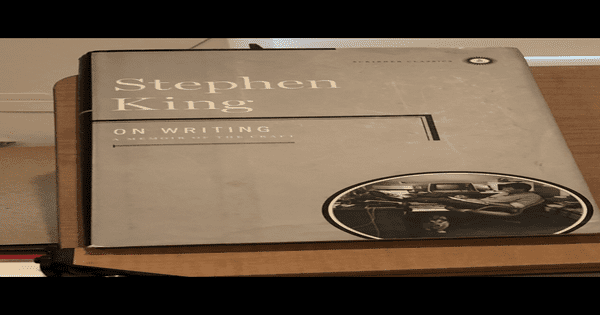Read And Write A Lot

I have over fifty books on my bookshelf in my office and most of them are writing resources. I like to refresh on certain things–like grammar rules, plot structure, and character traits–to boost my craft. My favorite book I enjoy referring to is Stephen King’s On Writing. Stephen King has been one of my biggest inspirations. Whether it is a short story or a novel, Stephen King has succeeded to be one of the best literary icons. He has written eleven short story collections and fifty-two novels. Many of his novels have become popular films.
What makes King phenomenal is not his fame but his perception of the art of writing. In On Writing, King keeps readers’ attention by sharing his own growth and writing tips with an excellent sense of humor. On Writing is not a mechanical guide on how to be a skilled writer, even though King discussed the fundamentals of the craft halfway through the book. It is a book that discusses writing through King’s personal journey of becoming a professional writer.
He not only teaches readers about writing techniques; King is giving readers an inside look of his life. He discusses his family and the struggles he has endured, both pre-fame and post-fame. It is nice to have an authentic example of what famous authors go through. Many writers believe that life would be easier when they become a bestselling author.
On Writing is organized into three essential parts. All parts are equally instructive and captivating. In Part I, King talks about his upbringing and his family in an autobiographical sense. He continues with discussing the craft of writing from his personal perspective in Part II. Part III is about his life after the tragic car accident that almost ended his life and writing career.
I believe that the book starts too slow with him reminiscing about his childhood. However, it was intriguing to see how he developed an interest in writing. Writing seems to be a major theme throughout his life. Like any other writer, King went through years of rejections, and he still had to do ordinary jobs to support his family. Although he struggled, he kept writing and received encouragement from his wife Tabitha.
Carrie has always been one of my favorites. I enjoyed learning how he came up with the idea (he was cleaning a girls’ locker room) and how much money he received for it. He earned an initial $2,500 for the hardcover rights, and he scored a life-changing $400,000 for the paperback rights when the most he expected was $60,000. It just proves that one small idea can turn into a major accomplishment.
Part III has the same memoir style as Part I, but it is shorter. It is about King’s horrific, near-death car accident. Though he doesn’t go into specifics about the accident or the driver, he describes how the plot twist (accident) altered his health and career as any good narrator does. Although part II is the most valuable, the memoir aspect of the book is great to refer to when the journey as a writer seems rough.
Part II is the part all readers should pay extra attention to. It is King’s guide to the craft of writing. His guide contains much of similar advice readers might find in other writing books, but King adds his own spin on what every writer should know. He begins with the basics of writing and finishes with how to find a publisher or literary agent. So, he fully takes readers through every step of the writing process.
King sections each topic and discusses each one in depth. He even suggests certain books to have, like Writer’s Market and Elements of Style. The section where he discusses the fundamentals of good writing is the best. According to King, there are two key criteria to good writing. They are a good grasp of the fundamentals and having the right instruments.
The fundamentals King discusses should be familiar to most people. They are listed below:
- Active and Passive Voice
- Adverbs / useless words
- Backstories, Info Dumps, and Flashbacks
- Descriptions
- Dialogue
- Grammar
- Paragraphs
- Plot
- Showing and Telling
- Vocabulary
I will not spoil the book by going into depth about what King said about each one, but I will share a couple of my favorite statements. The first one is about descriptions. King states that “description begins in the writer’s imagination, but should finish in the readers.” Each person interprets characters and events differently. The second one is about vocabulary. According to King, “one of the really bad things you can do to your writing is to dress up the vocabulary.” Simple words make any piece run smoother.
King does an amazing job breaking down the writing process by being straightforward and honest. He sugarcoats nothing, especially about uncertainties of making it in the writing world. I am glad I can obtain some of his wisdom by having this book. It has helped me stay on track. I highly recommend it to anybody who is starting a writing career or already started one. Like King has said, “if you want to be a writer, you must do two things above others: read a lot and write a lot.”










